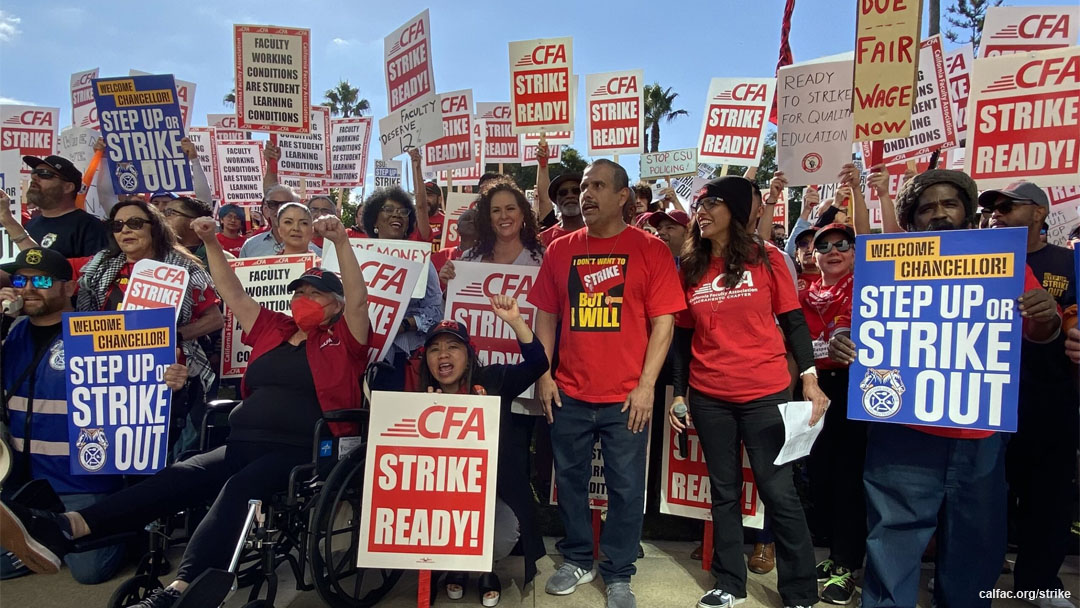NEWS ROUNDUP
Grocery merger decision near | Growers seek leeway | Stop pretending
Monday, December 4, 2023
LOCAL

► From the Northwest Labor Press — Decision nears on Kroger-Albertsons merger — What will happen if America’s two largest grocery companies combine? Will food prices rise? Will wages stagnate? Will smaller grocers go bankrupt because they can’t compete with a colossus that controls more than a third of the U.S. grocery market? For more than a year, the FTC has investigated those questions to determine whether Kroger’s offer to buy Albertsons would violate antitrust laws meant to prevent monopolies. Several antitrust experts interviewed for this story expect a final answer before Jan. 13, 2024, the date the companies tentatively set to close the deal. In many areas of Oregon and Washington, a Kroger-Albertons combination would create a grocery monopoly. Kroger owns Fred Meyer and QFC, and Albertons owns Safeway, Albertsons, and Haggen.
The STAND (July 27) — Urge FTC to block Kroger-Albertsons merger — UFCW 367 calls on the community to contact the FTC, voice concerns over megamerger.
(May 9) — Study: Kroger-Albertsons merger will cost workers over $300M
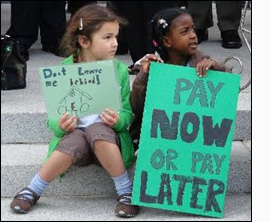 ► From the union-busting Columbian — Evergreen, Vancouver public schools brace for staff cuts in 2024 — It’s still 2023, but local school districts are already preparing for next year’s budget. Both Evergreen and Vancouver anticipate serious shortfalls requiring staff cuts, all while students are still struggling to recover from lingering effects of the pandemic. Inflation, stagnant state funding and the exhaustion of pandemic-era relief money leave the region’s largest districts millions of dollars short of what they said they need to support growing student needs.
► From the union-busting Columbian — Evergreen, Vancouver public schools brace for staff cuts in 2024 — It’s still 2023, but local school districts are already preparing for next year’s budget. Both Evergreen and Vancouver anticipate serious shortfalls requiring staff cuts, all while students are still struggling to recover from lingering effects of the pandemic. Inflation, stagnant state funding and the exhaustion of pandemic-era relief money leave the region’s largest districts millions of dollars short of what they said they need to support growing student needs.
► From the Wenatchee World — Concerns raised over USPS possibly moving some operations from Wenatchee to Spokane — U.S. Postal Service representatives this week discussed potentially moving some of the Wenatchee Processing and Distribution Center processing operations to the Spokane P&DC.
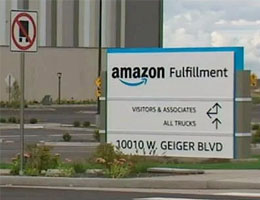 ► From the Seattle Times — Inside Amazon warehouses, workers worry about risk of unsafe chemicals — Warehouse workers at some of Amazon’s facilities have to handle potentially hazardous materials every day — and employees report feeling unsafe. In January, L&I inspectors cited Amazon’s Spokane warehouse for failing to properly train workers on how to handle hazardous chemicals or ensure employees wore appropriate eye protection, according to a previously unpublicized citation.
► From the Seattle Times — Inside Amazon warehouses, workers worry about risk of unsafe chemicals — Warehouse workers at some of Amazon’s facilities have to handle potentially hazardous materials every day — and employees report feeling unsafe. In January, L&I inspectors cited Amazon’s Spokane warehouse for failing to properly train workers on how to handle hazardous chemicals or ensure employees wore appropriate eye protection, according to a previously unpublicized citation.
► From the Olympian — Facing a $6.2 million budget shortfall, Saint Martin’s rolls back raises. Faculty aren’t happy — Cuts have been made to faculty pay, and faculty members are not happy about it. A Facebook post calls on the college to “honor the contracts” of faculty, which has attracted dozens of concerned comments.
AEROSPACE
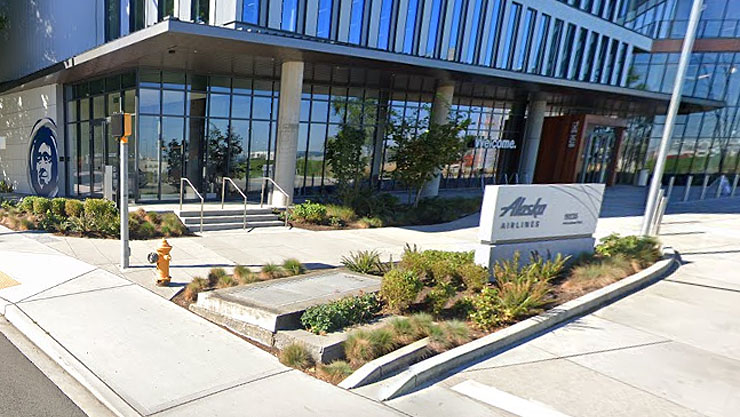
► From the AP — Alaska Air to buy Hawaiian Airlines in a $1.9 billion deal that may attract regulator scrutiny — The combined company, which would maintain both airlines’ brands, would be based in Seattle, with Alaska CEO Ben Minicucci at its head. The companies said they would keep Honolulu as a key hub and that they’re “committed to maintaining and growing union-represented workforce” in Hawaii. Minicucci told reporters at a news conference Sunday that it’s “too soon to tell” how many non-union positions would be eliminated once the combination is completed.
THIS WASHINGTON
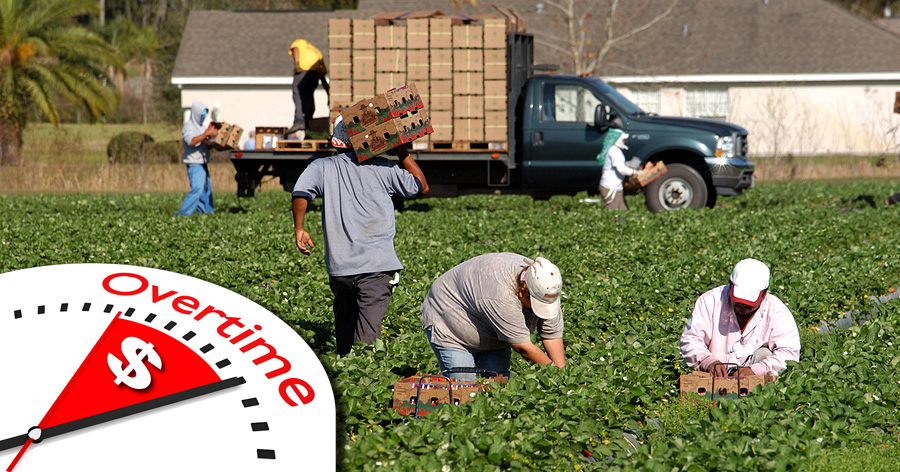
► From the Yakima H-R — Growers seek leeway under new WA agriculture overtime law — Agricultural workers in Washington will attain a historic milestone next month when, for the first time in state history, they will earn overtime pay if they work more than 40 hours in a week. The achievement is the result of 2021 legislation negotiated by labor advocates, agricultural producers and lawmakers that erased language in state law for more than 60 years that prevented farmworkers from receiving overtime pay. But farmers and growers are hoping lawmakers will relax the rules for up to three months a year to accommodate staffing needs at peak harvest times.
 ► From the Northwest Labor Press — Washington apprentices get help with child care — Working Connections Child Care (WCCC) is a state subsidy program that helps families pay for child care. In the past, a household had to make 60% or less of the state median income, less than $5,614 per month for a family of four, to qualify for the program. That excluded many union apprentices, who made too much to qualify for the program but still struggled with the cost of child care. Lawmakers this year passed HB 1525 to increase the income threshold to 75% of the state median income (about $7,000 monthly for a family of four) for families with at least one adult in their first year of a state-registered apprenticeship. The change took effect Oct. 1. WCCC drops the monthly cost of child care to $0 to $215, depending on a family’s income.
► From the Northwest Labor Press — Washington apprentices get help with child care — Working Connections Child Care (WCCC) is a state subsidy program that helps families pay for child care. In the past, a household had to make 60% or less of the state median income, less than $5,614 per month for a family of four, to qualify for the program. That excluded many union apprentices, who made too much to qualify for the program but still struggled with the cost of child care. Lawmakers this year passed HB 1525 to increase the income threshold to 75% of the state median income (about $7,000 monthly for a family of four) for families with at least one adult in their first year of a state-registered apprenticeship. The change took effect Oct. 1. WCCC drops the monthly cost of child care to $0 to $215, depending on a family’s income.
 ► From the Seattle Times — WA Sen. Rebecca Saldaña says cancer diagnosis won’t keep her from public lands race — State Sen. Rebecca Saldaña, D-Seattle, is staying in the race for state commissioner of public lands while she undergoes treatment for ovarian cancer, she said Saturday. Saldaña, 46, was diagnosed Oct. 27 and had a radical hysterectomy that same day. She began chemo Nov. 29.
► From the Seattle Times — WA Sen. Rebecca Saldaña says cancer diagnosis won’t keep her from public lands race — State Sen. Rebecca Saldaña, D-Seattle, is staying in the race for state commissioner of public lands while she undergoes treatment for ovarian cancer, she said Saturday. Saldaña, 46, was diagnosed Oct. 27 and had a radical hysterectomy that same day. She began chemo Nov. 29.
► From the Seattle Times — WA special education school accused of abuse is closing amid scrutiny — Northwest School of Innovative Learning, until recently Washington’s largest publicly funded private school for children with disabilities, announced plans to close amid a state investigation and a ban on accepting new students.
THAT WASHINGTON
► From the Washington Post — Factory reopening could save this town, but many still bash the economy — When Jason Vassar heard last month that his shuttered auto factory plans to restart, he considered it a “blessing.” The Stellantis plant in Illinois that laid him off in March had agreed to resume production and rehire its workers to help end a nationwide strike against the company. It even pledged to build a $3.2 billion battery factory next door, encouraged by the prospect of federal manufacturing subsidies from the Biden administration. But his view on the economy at the moment? “Terrible,” he declared. Many signs point to a healthy economy: GDP is rising, unemployment is at longtime lows, and wages are finally outpacing inflation. But for many Americans, the pinch of pricier everyday goods outweighs other economic indicators.
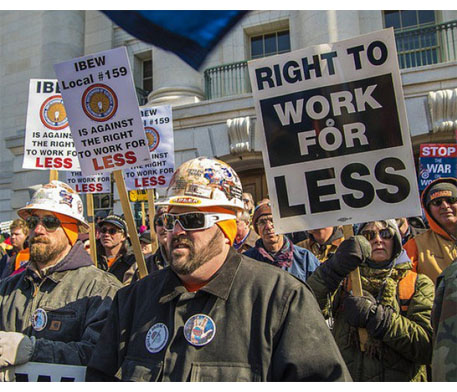 ► From the New Republic — The GOP showed again how anti-worker it really is — The GOP’s National Right to Work Act, sponsored and co-sponsored by 118 Republicans, would turn all 50 states into so-called “right-to-work” states, which ban union-security agreements. At the moment, 24 states are free bargaining states and 26 states are right-to-work. At a congressional hearing last week, Republicans pushed the legislation to gratify donors, the GOP’s only real constituency for union-bashing.
► From the New Republic — The GOP showed again how anti-worker it really is — The GOP’s National Right to Work Act, sponsored and co-sponsored by 118 Republicans, would turn all 50 states into so-called “right-to-work” states, which ban union-security agreements. At the moment, 24 states are free bargaining states and 26 states are right-to-work. At a congressional hearing last week, Republicans pushed the legislation to gratify donors, the GOP’s only real constituency for union-bashing.
► From Politico — Labor unions are still giving Democrats climate headaches — Despite the Biden administration and California lawmakers pouring billions of dollars into new climate-friendly industries like electric vehicles, hydrogen and building electrification, a key player in state politics — the State Building and Construction Trades Council of California — is still defending fossil fuel interests that provide thousands of well-paying jobs.
NATIONAL
► From the AP — California faculty at largest U.S. university system launch strike for better pay — Faculty at California State University, the largest public university system in the U.S., will hold a series of four one-day strikes starting Monday across four campuses to demand higher pay and more parental leave for thousands of professors, librarians, coaches and other workers.
► From the AP — Casino workers with MGM Grand Detroit ratify deal, ending 47-day strike — Their approval Saturday on a five-year agreement comes weeks after unionized workers reached an agreement with other two casinos following a roughly one-month strike. The new agreement, which covers about 1,700 employees, includes an average immediate 18% pay raise, workload reductions and no health care costs increases for employees.
READY FOR A RAISE? — Get more information about how you can join together with co-workers and negotiate for better wages and working conditions. Or go ahead and contact a union organizer today!
► From Truthout — Tired of low wages and workplace violence, Waffle House workers are organizing
► From Wisconsin Public Radio — Unions file new lawsuit challenging Act 10 collective bargaining law — Seven Wisconsin unions representing teachers and other public workers filed a lawsuit Thursday challenging the constitutionality of Act 10, which ended collective bargaining for most public employees. The law has been challenged in court numerous times since its passage in 2011 when it was championed by former Republican Gov. Scott Walker. But this is the first lawsuit since the Wisconsin Supreme Court has flipped to liberal control.
TODAY’S LIGHT READING
 ► From the Washington Post — A Trump dictatorship is increasingly inevitable. We should stop pretending. (by Robert Kagan) — The magical-thinking phase is ending. Barring some miracle, Donald Trump will soon be the presumptive Republican nominee for president. When that happens, there will be a swift and dramatic shift in the political power dynamic, in his favor… He will not be contained by the courts or the rule of law. On the contrary, he is going to use the trials to display his power. Can Trump win the election? The answer, unless something radical and unforeseen happens, is: Of course he can. Will his presidency turn into a dictatorship? The odds are, again, pretty good. This is the trajectory we are on now. Is descent into dictatorship inevitable? No. Nothing in history is inevitable. What is certain, however, is that the odds of the United States falling into dictatorship have grown considerably because so many of the obstacles to it have been cleared and only a few are left.
► From the Washington Post — A Trump dictatorship is increasingly inevitable. We should stop pretending. (by Robert Kagan) — The magical-thinking phase is ending. Barring some miracle, Donald Trump will soon be the presumptive Republican nominee for president. When that happens, there will be a swift and dramatic shift in the political power dynamic, in his favor… He will not be contained by the courts or the rule of law. On the contrary, he is going to use the trials to display his power. Can Trump win the election? The answer, unless something radical and unforeseen happens, is: Of course he can. Will his presidency turn into a dictatorship? The odds are, again, pretty good. This is the trajectory we are on now. Is descent into dictatorship inevitable? No. Nothing in history is inevitable. What is certain, however, is that the odds of the United States falling into dictatorship have grown considerably because so many of the obstacles to it have been cleared and only a few are left.
The Stand posts links to Washington state and national news of interest every weekday morning by 10 a.m.


